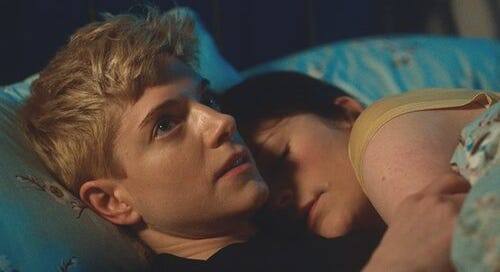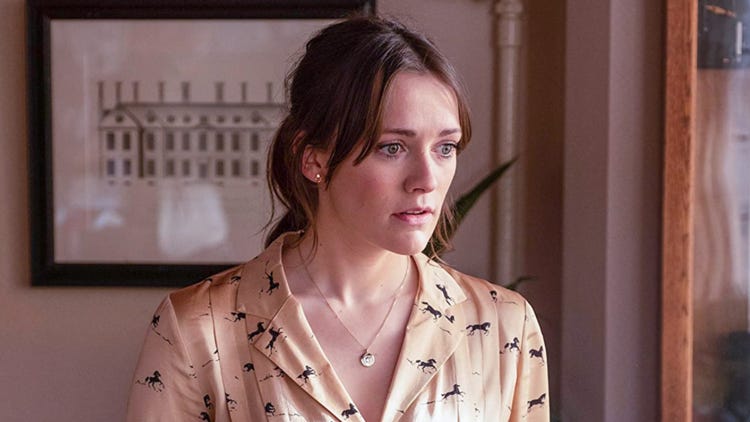Created by: Mae Martin and Joe Hampson
First Run: 2020-2021 (2 Seasons)
Watching Feel Good is like reading a deeply personal, darkly funny graphic novel about someone’s life. It plays like a series of comic vignettes that are loosely woven together in an overall story arc. Mae Martin (the comedian, rather than the character) has made a living off plumbing the depths of their queer and nonbinary experience and making fun of its absurdities, like any good observational comic. However, there are few comics out there who have so effectively transferred the wit and timing they have onstage on to the screen.
It’s difficult to explain why Feel Good is funny. Even the trailer works hard at convincing you the show isn’t funny, but it really is. It’s just that the themes it deals with are so raw, the problems it explores so innate to everyone’s doubts and fears, that when it’s described to you it feels like something that should be sad. When you’re watching it, you laugh because it’s hilarious and exquisitely delivered, but also because it’s truthful. Then, you might immediately cry for the same reasons.
Cursory research reveals that the subject matter is semi-autobiographical for the Canadian comic, and that’s genuinely how it comes across. Everything the characters say sounds like something your girlfriend, neighbour, best friend or parent might say - right down to the ridiculous, awkward stuff they blurt out and regret.
Mae (Mae Martin) is a standup comic living in London where she meets George (Charlotte Ritchie) at one of her gigs and falls completely, instantly in love. The trouble is, Mae is still trying their best to fix themself, and its a difficult time in their life for them to meet someone so important.
For her part, George has only ever been with men before, and spends an inordinate amount of time trying to live up to Mae’s dreams and expectations of the perfect relationship, while also attempting to hide her new feelings from her family and friends. She’s not ashamed as such, more confused at the sudden depth of her own emotions, and in no small measure utterly overwhelmed by Mae’s needs.
Mae is dealing with addiction, and some of the most hilarious (and sad) scenes happen as part of their Narcotics Anonymous group. They find a sponsor who is even more out of control and hopeless than they are, and proceed to stumble from mistake to mistake in a way that George finds both endearing and endlessly exasperating.
The truth is that Mae does not feel worthy of George, and every moment George spends hiding their relationship from the world feeds her fears. They hold on too tight, and try to test George’s commitment to them over and over in a weird, destructive effort to be proven right that the relationship is doomed from the start.
George, on the other hand, can’t shake the feeling that she’s just another in a long line of addictions for Mae, really a substitute for pills and cocaine in getting that rush that they crave.
Throughout the 6-part first series, Feel Good covers more ground than I’ve seen other shows take 22 episode seasons to traverse. George copes with coming out in a hilarious way to her friends and family, deals with her oddball roommate, attempts to support Mae as they re-lapse into addiction, and meets Mae’s very strange, uptight Canadian parents (Lisa Kudrow plays the mother in fine form) who Mae says “abandoned” them during her addiction. The truth, as you would expect, turns out to be far more complicated.
Mae herself is plagued with self doubt as to who and what they are, and rebuilding themself by sheer strength of will. The reason for the show’s success is that Mae is deeply flawed, but is at heart someone who has never lost hope that everything could eventually turn out all right. They are, however, a creature of extremes. When they’re happy, they are as free as a child. When they’re hurt, they back into a corner like a wounded animal. Every now and then they strike out at the world, but more often than not is the person most hurt by their rash choices.
Yes, the show is hilarious, but do prepare yourself for large, sobbing, gutwrenching tears. The darkness of their experiences and their deepest, most painful thoughts and feelings are the rich veins Mae Martin (the comedian and the character) taps for laughs, but it’s also the big black hole that will swallow them (and George) whole, and destroy everything they are together if they let it.
If you watch Mae Martin’s standup videos it would give you no inkling of how good this show is. Sure, they’re obviously talented, but this story needed all of these characters and different moving parts gathering around them to really do it justice. I can’t overstate how utterly compulsory a viewing experience this is.







